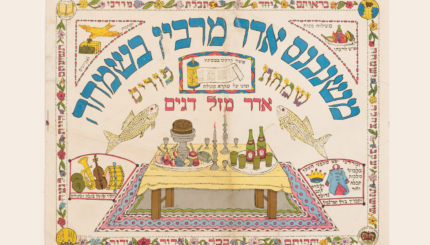I’ve always really liked . When I was younger, my main interest in the holiday was dressing up in fun costumes and eating hamentaschen. Although I still enjoy those aspects, I now appreciate Purim because it brings two independent women, Vashti and Esther, into focus. I’m certainly not the only one who has noticed Purim’s feminist quality; for decades, Orthodox women and men who are sensitive to gender issues have rallied around the holiday, taking Ta’anit Esther as an opportunity to talk about agunah and using Esther as an example of why Jewish women’s voices must be heard.
Although Mordecai is an integral part of the Purim story, Esther is undoubtedly the main character. However, based on the communal recitation of pesukim (verses) during the Megillah reading, one might think that Mordecai is the more important figure: of the four verses recited aloud by the congregation, three are specifically about Mordecai, and none invoke Esther. This erasure of Esther’s contributions to the story seems oddly dissonant with the overall feminist slant of the holiday. Consequently, some Orthodox feminists have begun to right this wrong and recite pesukim about Esther aloud as well.
Reciting pesukim out loud during Megillah reading is a minhag (practice) that dates back to the Gaonic period, although the verses of choice were not settled upon for another few centuries. Because the practice is purely minhag, there is no halakhic reason congregations can’t say additional pesukim about Esther out loud. Although reciting the four traditional pesukim has been part of the mesorah (tradition) for centuries, Judaism is a living religion that can and should be tweaked within the framework of halakha to remain contemporary.
For communities interested in introducing more gender parity to their Megillah readings, Kehillat Hadar has identified pesukim about Esther that are roughly parallel to those recited aloud about Mordecai. The first pasuk that we recite aloud, “In the fortress Shushan lived a Jew by the name of Mordecai, son of Yair son of Shimi son of Kish, a Benjaminite” (2:5), can be accompanied by, “He was foster father to Hadassah – that is, Esther – his uncle’s daughter, for she had neither father nor mother. The maiden was striking and beautiful; and when her father and mother died, Mordecai adopted her as his own daughter” (2:7).
As a parallel to 8:15, “Mordecai left the king’s presence in royal robes of blue and white, with a magnificent crown of gold and a mantle of fine linen and purple wool. And the city of Shushan rang with joyous cries,” perhaps recite Esther’s petition to Mordecai in 4:16, “‘Go, assemble all the Jews who live in Shushan, and fast on my behalf; do not eat or drink for three days, night or day. I and my maidens will observe the same fast. Then I shall go to the king, though it is contrary to the law; and if I am to perish, I shall perish!’”
In connection to “For Mordecai the Jew ranked next to King Ahaseurus and was highly regarded by the Jews and popular with the multitude of his brethren; he sought the good of his people and interceded for the welfare of all his kindred” (10:3) can come “And Esther’s ordinance validating these observances of Purim was recorded in a scroll” (9:32).
If you would like to recite pesukim about Esther aloud, but you can’t find a Megillah reading in your area that does, you should organize your own! You can register your reading on JOFA’s Project Esther directory. If you’ve never leyned before, you can also learn how to do so by using JOFA’s Megillah leyning app. Whatever sort of reading you end up attending or organizing, the important thing to remember is to enjoy it! Purim is a time of unadulterated simcha, and we can’t let anything – even frustrating little bits of perceived sexism – to take away from our joy.




